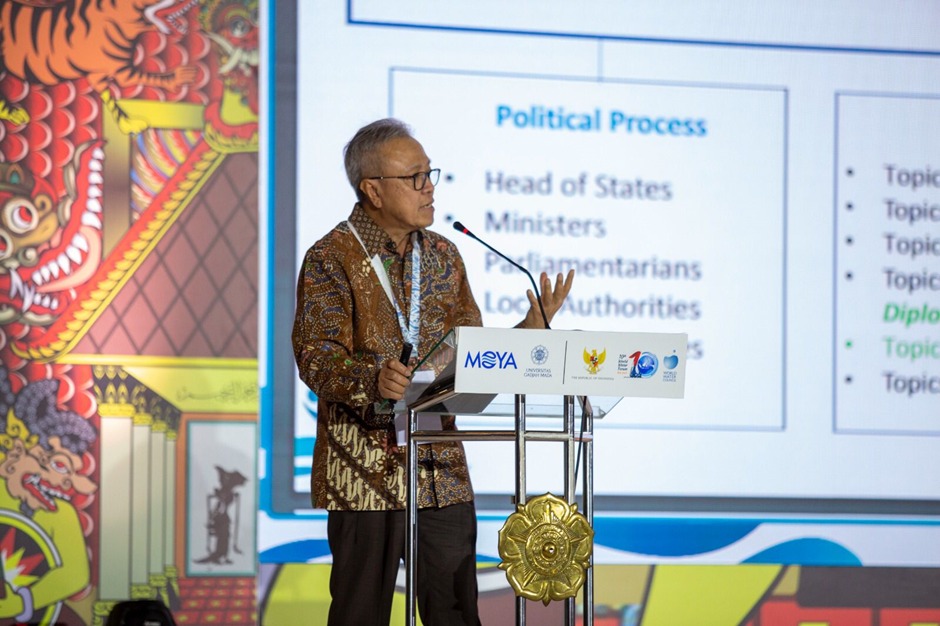The Ministry of Public Works and Housing of the Republic of Indonesia is currently preparing several schemes to support sustainable water financing, aiming to promote equitable access to clean water and sanitation.
"The water and sanitation sector faces various financial challenges that hinder the progress in improving access and services, including budget deficits and a high dependence on national budgets," said Herry Trisaputra Zuna, Director General of Infrastructure Financing at the Ministry of Public Works and Housing, during the 3rd Workshop of the World Water Forum 2024, Yogyakarta (4/7/2023).
According to the data from the Ministry of Public Works and Housing, globally, around 20 developing countries show a funding gap of 61% between the identified needs to achieve national targets for water, sanitation, and hygiene.
Innovative funding schemes which involve public participation are crucial in addressing global water-related challenges. So far, the provision of water infrastructure has been hindered by high investment costs, while the available budgets are limited.
Through the 3rd World Water Forum Workshop in 2024, the government of Indonesia aims to invite every country, organization, and funding institution to assess the challenges and opportunities in achieving sustainable water financing that benefits everyone.
Discussing 5 Important Topics
Inline with the objectives, the workshop attended by Senior Water and Sanitation Expert from the World Bank, Irma Setiono; Director of Housing and Settlement of the Ministry of National Development Planning, Tri Dewi Virgianti; Urban Development Expert Junko Sagara; and Director of Operations from Water.org, Don Johnston; addressed the theme "Securing and Increasing Funding for Basic Access to Safe Water and Sanitation for All at All Scales."
The discussions in the workshop were divided into five topics related to Sustainable Water Finance. First, improving the international water financing architecture by introducing the "New Economics of Water." Second, promoting innovative and sustainable funding, financing, and delivery mechanisms.
Third, securing and increasing funding for basic access to clean water and sanitation. Fourth, special schemes and incentives to promote green finance. The last is securing and increasing funding to prevent and overcome water crisis, water disasters, and enhance climate resilience.
The Community-based Approach

The community-based approach plays a crucial role in providing water infrastructure and addressing water-related challenges. The involvement of the community will foster a sense of ownership and responsibility, resulting in sustainable and targeted solutions.
During the discussion on community-based water and sanitation, Senior Water and Sanitation Specialist at the World Bank Irma Setiono stated that communities have the opportunity to become providers of additional water services, especially for those living in slum areas who struggle to access water services from the government.
Accordingly, Urban Development Specialist Junko Sagara emphasized that small-scale community partnership projects can effectively and sustainably enhance capacity and utility.
"Traditionally, PPPs projects that focus on large scale projects are quite impactful but it is difficult to implement and take a long time to prepare. It irequire so much support from the sentral government,” said Junko.
Furthermore, Director of Operations at Water.org Don Johnston highlighted the importance of partnerships among entrepreneurs, households, financial institutions, and the government in bridging the financing gap in water infrastructure. According to him, this gap is not solely about money.
One of the success stories of a small-scale public-private partnership is the Community-Based Drinking Water and Sanitation Program (PAMSIMAS). By the end of 2021, PAMSIMAS had provided an average support of 17.98% national access to safe drinking water.
Ensuring the Success of the World Water Forum
The workshop, as part of the Road to the World Water Forum, has produced several recommendations regarding sustainable water management financing that can be formulated together during the peak event of the 10th WWF next year.
Discussions on water financing in this workshop are an important step towards the success of the 10th World Water Forum, which will take place on May 18th to 24th, 2024, in Bali.
Through intensive discussions involving stakeholders at various scales, it is hoped that these discussions will facilitate the implementation of the aspirations and the theme of the 10th World Water Forum, "Water for Shared Prosperity," where the world will no longer experience a lack of access to clean water.